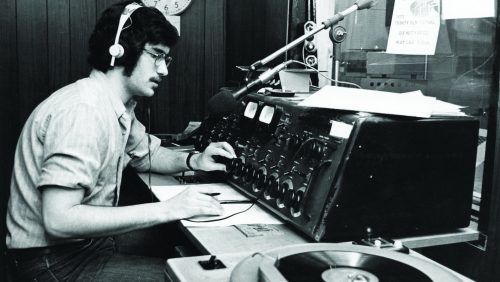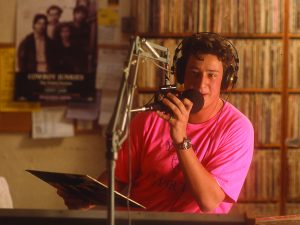The Enduring Voice of Trinity College
Originally published in The Reporter, winter 2022.

WRTC-FM Marks 75 Years
BY KATHY ANDREWS
More than 60 years after graduation from Trinity College, when Bryan Bunch ’57 hears the dramatic orchestration of Stravinsky’s “Infernal Dance of King Kastchei,” he is transported back to the WRTC studio, where he hosted a Saturday night program featuring classical music of the 20th century. “I still think of it as my theme—it was used to introduce the show—and I am a bit thrilled to hear it,” says Bunch.
These days, Amelia Huba ’22 hosts a classical program, A Tempo, and serves as the station’s music director. While she doesn’t have theme music, her favorite piece is Chopin’s “Raindrops.” Huba learned about WRTC as a first-year student, at the Involvement Fair held at the start of each semester. “It seemed like such a unique experience, and I fell in love with the studio my first time there. Talking about music I love is such a rewarding experience,” she says.
Ever since its on-air debut in 1947, WRTC has been a labor of love for students and others who volunteer at the station and a source of entertaining and thought-provoking programming for listeners.
Today’s WRTC covers the musical gamut with an average of 60 shows per week, from rock and jazz to soul, gospel, funk, punk, Latin, reggae, blues, country, Caribbean, classical, and African music. Interview and commentary programs, live Trinity sports coverage, a Russian program, and two Portuguese shows round out the programming mix—or at least they did at the time of the deadline for this issue of The Reporter. The lineup can change by the semester or when students leave campus for summer and winter breaks. Some shows last decades, while others come and go.
WRTC involvement is a point of pride for many alumni, some of whom remain active long after graduation. Reynolds Onderdonk ’76 was 18 when he first volunteered at the station. Also known as Reynolds the Psychedelic Warlord (his on-air personality), Onderdonk continues to host Alien Rock, as he has for more than 46 years. For his day job, he teaches high school history.
A huge loss for the station and the college community came in 2018 when Bob Parzych ’76, then-general manager, jazz and sports director, and longtime host of The Kitchen Sink of Jazz, passed away. His presence and influence was a constant at the station for 45 years. Professor of Engineering Joe Palladino, faculty adviser to the station since 2019 and an avid WRTC listener for 30-plus years, remembers the first time he heard Parzych. “I was a young professor, and it was the end of the fall semester; I had a lot of grading to do. I had WRTC on, and I heard the most bizarre show, the On-Again/Off-Again Bob Parzych Christmas Show. There were corny holiday songs and jokes. I was thinking: What is this show? I couldn’t stop listening.”
Along with students, alumni, and a few faculty and staff members, Greater Hartford community members produce the shows at WRTC’s modest studios, located since 1993 on the ground level of High Rise residence hall, after a move from the station’s longtime location in Cook Hall. When fewer students are on campus, more openings are available for community member-hosted shows. WRTC’s only paid, part-time staff members are General Manager Chris Cowles, also host for nearly 27 years of Greasy Tracks, featuring music “steeped in Southern soul,” and John Schwenk, chief engineer since 2003.
As WRTC marks its 75th anniversary, its audience includes campus listeners and others from throughout the Hartford area, thanks to the station’s 300-watt signal. It broadcasts live 24 hours a day, seven days a week at 89.3 on the FM dial, and, as of the early 2000s, internet listeners can livestream it from anywhere. With the 2009 addition of a rolling two-week archive of programs, created by Andrew Budd ’08, people can listen to favorite shows at any time of day via WRTC’s website, wrtcfm.com. And a renovation to make the studios a little larger and brighter is planned for the next year or so. Money for the project was raised from the past five or six years of the station’s annual fundraising effort; now it’s a matter of finding the opportune time for the college to schedule the construction.
‘It’s their radio station’
Says Cowles, “A very important aspect of WRTC is that it belongs to the students. The rest of us, including the alums, are just visiting.” The student-run executive board of WRTC makes most policy decisions. When it comes to show hosts, Schwenk says, “We always give priority to the students, both for the training class and for on-air slots. It’s their radio station. Community members come in to the extent that students can’t cover all of the roles.”
The station’s inception on February 26, 1947, was a student team effort. Using a homemade, 10-watt transmitter, four students shared a single microphone and a pair of turntables for their debut broadcast, transmitted from Jarvis Hall. In the early years, WRTC hosted appearances by student performing groups such as the Pipes (a cappella) and the Jesters (drama). Student interviewers conversed on-air with famous entertainers, including singer Patti Page and pianist/band leader Stan Kenton. One student, Stan Marcuss ’63, had a rare opportunity in 1962 to interview famed poet Robert Frost, who visited campus. Recalls Marcuss, “My questions were excessively sophomoric, though I was a junior at the time. His answers were elegantly senior and tolerant.”
One wave of change arrived in the 1970s, when Black student broadcasters held a sit-in at WRTC, seeking a greater voice on campus and more air time from the station. Their efforts resulted in establishing, in 1976, the “Thought Power” programming block that continues to air more than 40 hours of Afrocentric programming each week.
Beginning in 2012, Seth Markle, associate professor of history and international studies, has offered an independent study to Temple of Hip Hop student members, enabling them to co-produce and co-host a WRTC show on global hip hop music and culture. Between 2013 and 2018, he says, Trinity undergraduate students produced and hosted more than 70 shows for WRTC. “Not only were students playing and discussing positive hip hop in the U.S. and beyond, they were also addressing issues about campus culture and the struggles and triumphs of POC students at the college,” says Markle.
Current co-station managers Maura Keary ’22 and Alex Chambers ’22 say that most students who get involved at WRTC do so because they see posters around campus or they know another student who hosts a show.
Keary and Chambers co-host the Bantam Backroads country music show, and with assistance from Cowles, they arranged to interview Nathan Carter, an Irish country singer who came to Hartford to perform at The Bushnell. Cowles taught Chambers and Keary how to edit and produce the interview. Says Chambers, “We’re cutting things together and putting them with music, so by the time we’re done, the whole show is set with the interview mashed together with the music. Learning that process was awesome.” Adds Keary, “I actually had family in Ireland listening to our interview with Nathan Carter, which was very cool.”
‘Every life has a soundtrack’
As a soldier stationed in Germany in the 1970s, James Ransom Reed IDP’83 created the character of Jocko Jim as a way to narrate stories of his life in the army. With a deep and resonant voice to begin with, Reed lowered his voice even more and recorded personalized cassette tapes to mail home to his family and friends. Today, Reed’s audience gets a regular dose of that voice—and Reed’s warm and engaging patter—by listening to WRTC’s Jocko Jim’s Gig and Get-together.
Says Reed, “I like to say that I play music from the archives of your lives. Every life has a soundtrack, and if you go back to those moments in your life, bad or good, there was music playing, you were singing songs.”
For Michele Sensale ’85, who alternates hosting Alien Two Punk Divas with Rita Scuris ’88, being on the radio means playing music she loves, mostly from the ’80s and ’90s, and connecting with college buddies and others who reach out by social media to say they’re listening. Sensale says, “My motivation is simple: I’m an attorney who needs a creative outlet.” She adds, “DJ culture is very much alive, and WRTC gives you a platform to share your love of music with others and turn people on to music that they may not know or that they have left in the past. There is something very fulfilling about that.”
Won-Ldy Paye IDP’16, host of African Ambience, was drawn to WRTC after having DJ’d previously at the University of Washington’s station in Seattle. “All the different genres of music make WRTC different than other stations,” says Paye. “I wanted to contribute to the diversity of the campus. Being an African music enthusiast, I thought, well, this will give another flavor.” Originally from Liberia, Paye is an artist, performer, and co-author of several children’s books. “In many African languages, education, learning, pretty much everything comes to you orally. And much of it comes through music, songs, things that you learn growing up. My deal on the show is to entertain you as well as making you aware of your own surroundings, making you aware of life.”
‘Relevance’
Of all the important moments in WRTC’s history, says Cowles, among its proudest was how the station managed to persist through challenges posed by COVID-19. “Once the pandemic hit, we were the only noncommercial station in the state that remained on the air live in the studio—everybody else went to a prerecorded status, and they were not in the studio.” Not that it was easy; for many months, there was regular COVID testing, and only one person—the show host—was allowed in the facility at a time.
Adds Palladino, “It’s remarkable that during COVID, even without a fund drive, WRTC would get checks in the mail from random people who would say, ‘I really like your station, here’s 200 bucks.’ So I think WRTC really has reach and impact, maybe even more so than in the old days.”
In his faculty adviser role, Palladino is the official liaison between the station and the college. But he downplays his contributions, crediting all the important behind-the-scenes work to the students and to Cowles and Schwenk.
Asked if there is something about WRTC that he wished more people knew, Palladino responds without hesitation. “In a word, it would be relevance. People still listen to the radio, and, with the internet and streaming, people listen to the radio all over the world. It’s rare to have a radio station for 75 years, and it’s something that should be cherished and showcased.”

